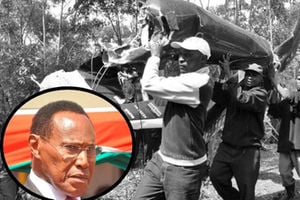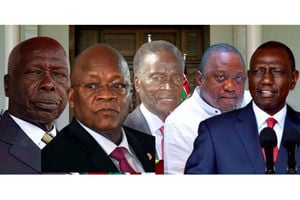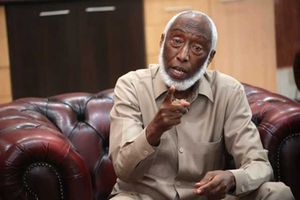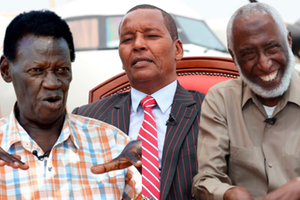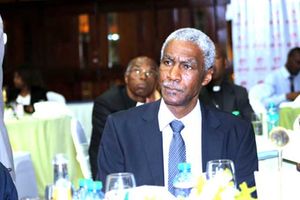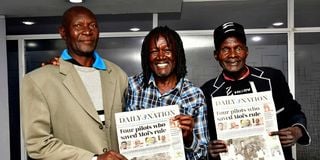
From left: Rtd Senior Private Manase Tembesa, Rtd Senior Private Kipkurui Rotich Yopsoi and Rtd Senior Private Robert Mugambi Karuaki hold a copy of the Daily Nation newspaper on 1 August 2024.
Robert Mugambi was among 3,000 people who were picked in a July, 1976 countrywide military recruitment drive.
After completing his Form Four exams, Mugambi’s family could not afford to pay for his A-Level studies. So he moved to Wajir, with setting up a business being his first priority.
But the lure to join the military won Mugambi over. Unknowingly, this decision would sent him to jail for alleged abetting of plotters of the failed August 1, 1982 coup.
Successful candidates in Wajir were flown to Eastleigh Air Base in Nairobi, where Mugambi met Hezekiah Awuor Ochuka, a hot-blooded, animated and interesting young man, for the first time.
The two found themselves in the same platoon and were both to undertake Kenya Air Force courses in Eastleigh for six weeks.
“I was picked for aircraft engineering (A&E). Ochuka was picked for electrical instruments (E&I). We were in the same platoon and our beds were next to each other. We were just in different classes in Lanet.After polishing boots, we would hang out and he would teach me a little Dholuo as I taught him a little Meru,” Mugambi said in an interview with the Nation on Wednesday. “He was posted to Eastleigh and I went to Nanyuki. But we would still interact whenever I would come to Nairobi or if we met on other military duties,” Mugambi added.
Electrical instruments
In 1980, their paths temporarily crossed again, this time in England. Mugambi was undertaking a seven-month jet propulsion course, while Ochuka was doing one on electrical instruments.
The next time their fates would intertwine was on account of Ochuka’s daring attempt to overthrow President Daniel Arap Moi, as both were held at the Kamiti prison.
Ochuka was at the maximum security wing, while Mugambi was held at the medium security wing of the prison complex.
On July 31, 1982 Mugambi was one of the few officers at Nanyuki air base. That week a good chunk of military personnel was in Lodwar for the war games – a series of battle simulations in which military personnel test various strategies and tactics. Just like Ochuka, Mugambi was a senior private-grade one. This was the second lowest rank in the Air Force.
Being a Saturday, Mugambi and several other young personnel opted to head to Nanyuki for the night and paint the town red.
At around 5am, a military Land Rover sped into Nanyuki town. It stopped at every watering hole, and its occupants would order all air force personnel to quickly return to the air base.
Once there, everyone was ordered to go straight to the armoury, even before changing into military fatigues, to pick a gun. Mugambi recounts that the orders were issued at gunpoint, by junior officers. After arming themselves, the Air Force personnel were expected to parade within the base. Technicians were ordered to do pre-flight service on aircraft at the base. Mugambi worked on the strikemaster, a British model largely used for training and light attacks.
“One I remember precisely was (Charles Odawa) Mirasi. He used to work with the F5s there. When we were on parade, they ordered that they wanted aircraft to be armed. Technicians of the various aircraft had to go and do pre-flight servicing. I was one who was ordered to do pre-flight servicing on the strikemaster aircraft and then have the armourors arm it,” Mugambi said.
As per military regulations at the time, once technicians have serviced an aircraft, they had to log their work and have it signed by a non-commissioned officer, and then a senior commanding officer.
In Nanyuki, Kenya Air Force officers had largely been left out of the coup plot.Mugambi says officers were locked in the air base mess. There was no one to sign the paperwork.
He said an officer he remembers as Mworia was pulled out of the mess and forced, at gun point, to sign the service paperwork.
All the while, very few people knew what was happening.
Civilian clothes
Mugambi opted to run away. He sneaked out of the base in an ambulance. The ambulance driver was a private he only remembers as Gikundi. Mugambi got off in Nanyuki town. Once there, he changed into civilian clothes and hid his gun in a bush before entering a bar.
At 6am, while still at the bar, Mugambi heard an announcement by Voice of Kenya’s Leonard Mambo Mbotela that the government had been overthrown.
Things now made sense. Still afraid, he stayed in Nanyuki town until the evening of August 1, 1982.
“(At the air base) I explained that I had even hidden my gun. I was escorted to where I had hidden my gun. We picked it and returned to camp. The same night we were all arrested at the base. Without even eating supper. Some were taken to Meru prison, others to Kingongo prison and some to Nanyuki prison. We were denied food. The following evening at around 8pm, we were bundled into a lorry and moved to Kingongo. That was Tuesday (August 3) night. Still no food. We stayed for four days without any food. We were not told why we had been arrested,” Mugambi recounted.
Following orders
After 14 days, the Air Force personnel were released and they returned to the Nanyuki base. Each one was asked to give a detailed statement of their movements and actions from the evening of July 31, 1982, until their arrest.
A few days later, they were bundled up afresh and split into three categories based on the contents of their statements.
Those marked red were deemed to be actively part of the coup. Those marked yellow were deemed to be on the periphery. Green was for those who were tricked into participation under the guise of following orders.
Mugambi was marked green and moved to Kamiti medium security prison.
Mugambi saw the suspected coup plotters, among them his old friend Ochuka and Raila Odinga, son of former Vice President Jaramogi Oginga Odinga. They did not, however, get any chance to interact.
In October, 1982, many were transferred from Kamiti, this time to Naivasha maximum security prison. In Naivasha they were tortured into confessing guilt.
Sign documents
“We were so traumatised that we stopped denying anything. We were told to sign documents we didn’t even understand. If you refused, you would be left in a six-inch-high pool of cold water for two days. That pool is also your toilet,” Mugambi said.
Those who didn’t bow to the torture in Naivasha were released in March, 1983.
Those who confessed were court-martialed and given various prison terms.
Mugambi was given a four-year sentence and moved to Shimo La Tewa prison in Mombasa.
Following international criticism of President Moi’s handling of the situation, many prison terms were reviewed downwards.
Mugambi’s was cut to two years and he was released on December 9, 1984. Now 70 years old, Mugambi lives in his native Meru County.

